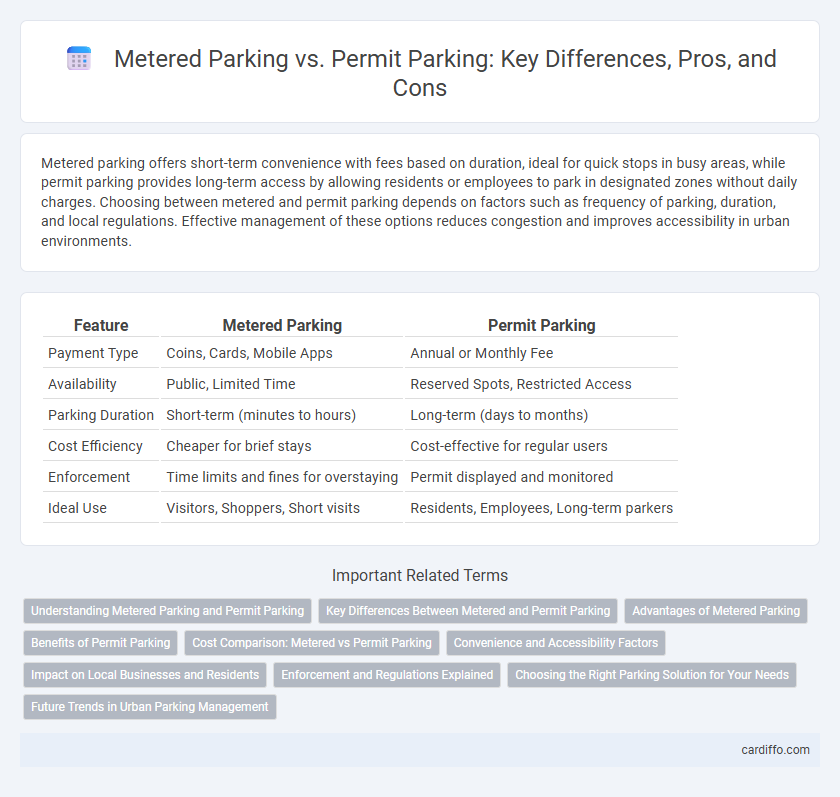Metered parking offers short-term convenience with fees based on duration, ideal for quick stops in busy areas, while permit parking provides long-term access by allowing residents or employees to park in designated zones without daily charges. Choosing between metered and permit parking depends on factors such as frequency of parking, duration, and local regulations. Effective management of these options reduces congestion and improves accessibility in urban environments.
Table of Comparison
| Feature | Metered Parking | Permit Parking |
|---|---|---|
| Payment Type | Coins, Cards, Mobile Apps | Annual or Monthly Fee |
| Availability | Public, Limited Time | Reserved Spots, Restricted Access |
| Parking Duration | Short-term (minutes to hours) | Long-term (days to months) |
| Cost Efficiency | Cheaper for brief stays | Cost-effective for regular users |
| Enforcement | Time limits and fines for overstaying | Permit displayed and monitored |
| Ideal Use | Visitors, Shoppers, Short visits | Residents, Employees, Long-term parkers |
Understanding Metered Parking and Permit Parking
Metered parking requires payment for a limited time through parking meters, often regulated by hourly rates and enforced in commercial areas to maximize turnover. Permit parking restricts access to vehicles with authorized permits, primarily designed for residents or specific groups to ensure long-term availability and reduce congestion. Understanding these systems helps drivers comply with local regulations and avoid fines while optimizing parking options in urban environments.
Key Differences Between Metered and Permit Parking
Metered parking requires payment for a specific time period and is typically available to the general public, while permit parking restricts access to authorized vehicles displaying valid permits, often designated for residents or employees. Metered parking uses coins, cards, or mobile apps for fee collection and enforces time limits through parking meters, whereas permit parking relies on permit issuance and enforcement by local authorities to prevent unauthorized use. The key differences include payment methods, accessibility, enforcement mechanisms, and intended user groups, impacting convenience and availability for drivers.
Advantages of Metered Parking
Metered parking offers flexible, short-term options ideal for high-traffic urban areas, maximizing space turnover and accessibility for visitors and shoppers. It generates direct revenue for municipalities, supporting maintenance and infrastructure improvements. The system encourages efficient use of limited parking resources by discouraging long-term occupancy, ensuring more users can benefit from available spots.
Benefits of Permit Parking
Permit parking offers consistent access to designated areas, reducing the hassle of searching for available metered spots and avoiding frequent payment interruptions. It ensures long-term parking security for residents or employees, often at a lower cumulative cost compared to metered parking fees. Permit systems also enhance neighborhood traffic management by limiting non-resident vehicle congestion and supporting local community needs.
Cost Comparison: Metered vs Permit Parking
Metered parking typically involves paying by the hour, with rates varying between $1 to $5 per hour depending on location and demand, while permit parking usually requires a fixed monthly or annual fee averaging $50 to $200, offering cost efficiency for long-term parking needs. Frequent parkers in urban areas often find permits more economical, as cumulative metered fees can exceed permit costs within weeks. Metered parking suits short-term visitors aiming to minimize upfront costs, whereas permit parking benefits daily commuters and residents seeking predictable and lower overall expenses.
Convenience and Accessibility Factors
Metered parking offers short-term accessibility with flexible payment options, making it ideal for quick stops in busy urban areas. Permit parking enhances convenience for regular users by guaranteeing a dedicated space, reducing search time and stress in crowded neighborhoods. Choosing between the two depends on the frequency of use, desired parking duration, and proximity to key destinations.
Impact on Local Businesses and Residents
Metered parking increases customer turnover, benefiting local businesses by creating more frequent access for shoppers, but it can lead to higher parking costs and stress for residents. Permit parking provides guaranteed parking for residents, improving their convenience and reducing congestion, but it may limit customer access and reduce foot traffic for nearby shops. Balancing metered and permit parking is crucial to support vibrant commercial activity while maintaining quality of life for residents.
Enforcement and Regulations Explained
Metered parking enforcement relies on time-based payment compliance monitored by parking attendants or automated systems, with fines issued for expired meters. Permit parking regulations restrict access to designated vehicles displaying valid permits, enforced through routine patrols and automated license plate recognition technology. Both systems aim to optimize space utilization and reduce unauthorized parking through clearly defined rules and penalties.
Choosing the Right Parking Solution for Your Needs
Choosing between metered parking and permit parking depends on frequency and duration of parking needs; metered parking suits short-term visits with hourly fees, while permit parking offers long-term access and cost savings for daily use. Consider location convenience, budget constraints, and availability when selecting a solution; permit parking often guarantees a dedicated spot, reducing search time and stress. Evaluating these factors ensures an efficient and cost-effective parking experience tailored to personal or business requirements.
Future Trends in Urban Parking Management
Future trends in urban parking management emphasize the integration of smart technologies in both metered and permit parking systems to optimize space utilization and reduce congestion. IoT sensors and dynamic pricing models are being deployed to adjust fees in real-time based on demand, while permit systems increasingly leverage mobile apps and digital credentials for seamless access control. Data analytics and AI-driven platforms are transforming urban parking strategies by enhancing efficiency, sustainability, and user convenience in city environments.
Metered parking vs permit parking Infographic

 cardiffo.com
cardiffo.com